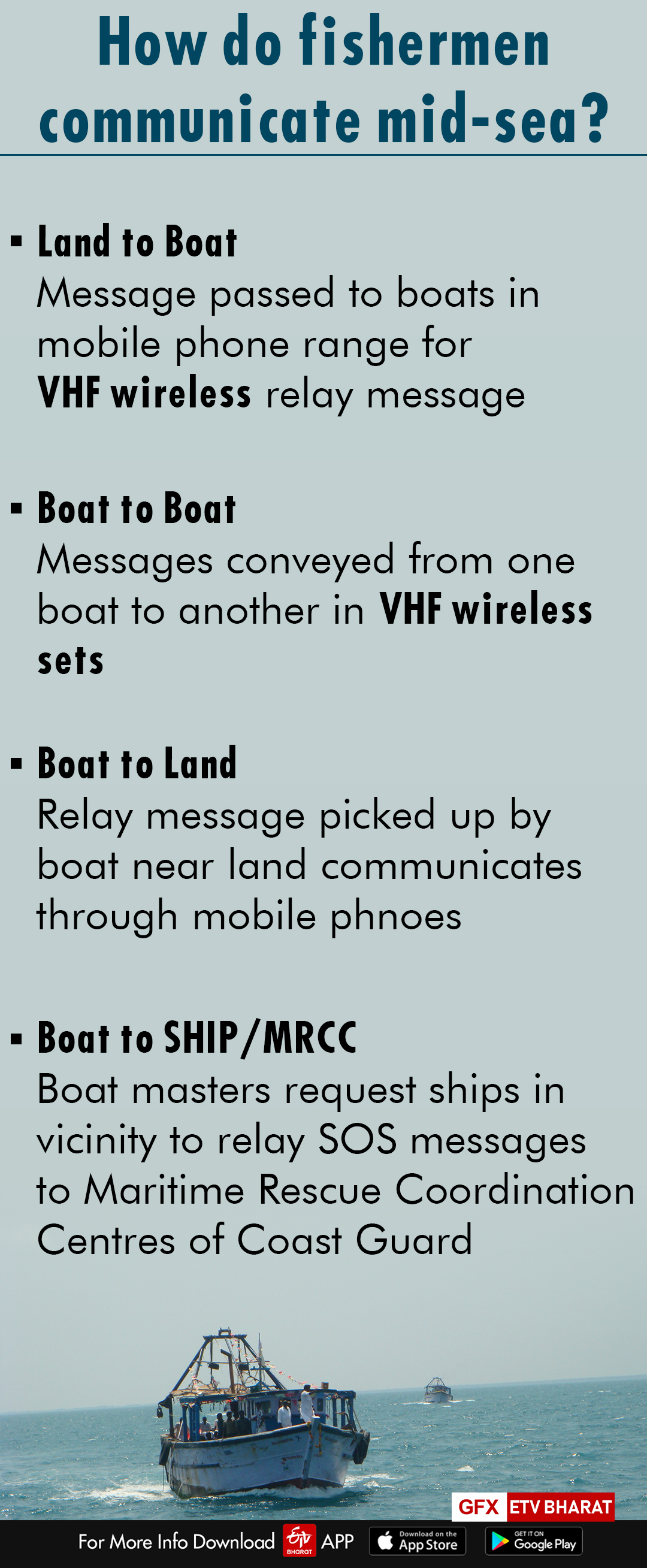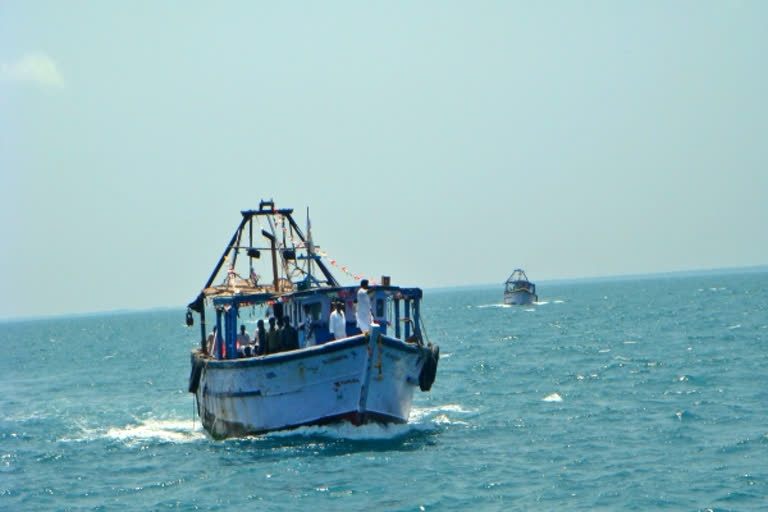Hyderabad: The fishing industry has come really far since the country introduced mechanized fishing along the coast with the help of Norway under its Blue Revolution schemes in the 1970s. But the communication at sea still remains in its nascent stages for the fishing community, that many a time leads to life or death situations for a section of Tamil Nadu fishermen who sail as far as 1500 nautical miles to catch fish.
There was a protest in Thoothoor fishing village in the state recently in which the fishermen launched a novel protest of handing over their satellite phones back to the authorities. The fishermen complained that the satellite phones were of poor range and little use during their fishing expeditions.
Relaying information boat by boat
Communication at sea without modern equipment is a tricky affair, especially after the shore disappears just one nautical mile out, up to which the local mobile connectivity works.
Fishing boats use a high-frequency VHF network to communicate among themselves. This VHF network works better during sunny days with a clear range of 40 to 60 kilometres but turns abysmally low when the sea turns turbulent.

In case of emergencies or SOS situations, the fishing boats follow a pattern of communication weaving a kind of relay system. The boat which wants to communicate starts a relay transmission using their VHF handsets, requesting the nearby boats or ships to pass on the message and the boats which pick up their frequency post the same message for the relay.
Deep-sea fishermen of Thoothoor
Thoothoor is a village panchayat, consisting of eight fishing hamlets, on the Western coast of Tamil Nadu’s Kanyakumari district. What makes Thoothoor fishers special is that they are traditional shark hunters who mainly use hooks for fishing. When the fishing industry modernized along the Coast, these shark hunters evolved into something bigger than their counterparts along the coast. While the traditional fishermen adopted trawl fishing, the Thoothoor fishermen started taking up deep-sea fishing using long lines (hook fishing) sailing as far as 1000 to 1500 nautical miles with each fishing trip taking anywhere between 30 to 45 days.

Also read: Sri Lanka Navy arrests 54 Indian fishermen, seize 5 trawlers
It can be recalled Indian or Tamil Nadu fishermen are frequently apprehended by the Sri Lankan navy due to the row with Sri Lankan fishermen, but these deep-sea fishermen were a couple of times arrested by foreign navies including the British Navy when they accidentally strayed into British Indian Ocean Territory (BIOT) in the Indian Ocean. On other occasions, they were apprehended by the Seychelles Navy, Bangladesh Navy.
Cyclone Ockhi and its aftermath
Cyclone Ockhi that formed in November 2017 caught the deep-sea fishers off guard as such cyclones are rare in the region. As many as 1500 fishermen were initially feared lost in the cyclone with the death toll finally settling down below a hundred as many fishermen managed to reach the shore after a week. But it caused quite a stir in the region as the fishermen who have been feeling neglected for long used the opportunity to raise their plight with then Defence Minister Nirmala Sitharaman. They have registered that their range of fishing is really far from the Indian Coast Guard or Navy who usually patrol in the Exclusive Economic Zone of the country i.e 200 nautical miles from the shore. One among the demands of fishermen was that they lack modern communication equipment like satellite phones.
The use of satellite phones by the fishing community along the Indian Coast is banned due to the fear of such equipment falling into the hands of terrorists, especially after the 26/11 Mumbai Terrorist attack. However, the centre agreed to provide the satellite phones to deep-sea fishermen of this Coastal Village after Cyclone Ockhi and some 500 handsets of BSNL ISAT-2 were distributed by BSNL.
Weak and faulty network
The central government organization BSNL provided these satellite phones under subsidy in which the fishermen have to pay the initial down payment of Rs 12000 for the Rs 60,000 worth of equipment. Later on, they have to pay a monthly fee of Rs 1181 in addition to the monthly recharge. The fishermen, parched for the connectivity at sea, grabbed the handsets. However, they soon realized that the handsets are not sufficient for their needs during their use at sea.
Also read: Riders of the deep sea rehash ancient fishing practice in lockdown
Fisherman Johnbosco from Erayumanthurai said that they have to bring the phone outside the wheelhouse to make a call. Further, the phones don't connect beyond 200 nautical miles. For these fishermen, 200 nautical miles is where they actually start casting their long-lines (hooks) before venturing deeper and deeper into the Indian Ocean or Arabian sea. “Technically, the phone is not of much use in our deep-sea expeditions. During inclement weather, how can we come out of the wheelhouse to make the call?” the sea battered fisherman asked.
Need for the better satellite phones
Recently, BSNL hiked the monthly rent from Rs 1181 to Rs 3441 and started slapping heavy fines on fishermen if they fail to pay this fee which triggered a protest.
Jose Bilbin, President of Thoothoor Deep Sea Fishermen Cooperative Society said that there are more advanced satellite phones available in the market.
“In the deep sea, communication is the key. The state and central government should find ways to equip us with connectivity like in the ships. Why should our fishermen pay for phones which are not of much use to them in deep-sea?” he reasoned.
Our Sri Lankan counterparts who practice deep-sea fishing in the Indian Ocean are better equipped with Radio Transmission for contacting the shore, he said. Bilbin also demanded that the rental fee recently hiked by BSNL should be repealed.
State government escalates the issue to centre
Fisheries officials of the Tamil Nadu government said that the satellite phone issue with BSNL has been communicated to the Union Secretary of Telecommunications. “We have raised the issue with the central government, requesting BSNL to retain the old rental fees,'' said a senior official at the Fisheries Department.
Also read: 8 fishermen stranded off TN coast rescued by Coast Guard
The state government has communicated to the centre that the issue should be resolved before October so that it is helpful for the fishermen during cyclonic weather conditions.
The state fisheries department is also collaborating with ISRO to install transponders in all the fishing vessels in the state. The transponders will enable the Automatic Identification System (AIS) to track the fishing vessels in the sea. Besides, the fishermen will be able to send SOS through such transponders and there is also a two-way facility to communicate emergency messages to fishermen in the open sea, official sources said.



